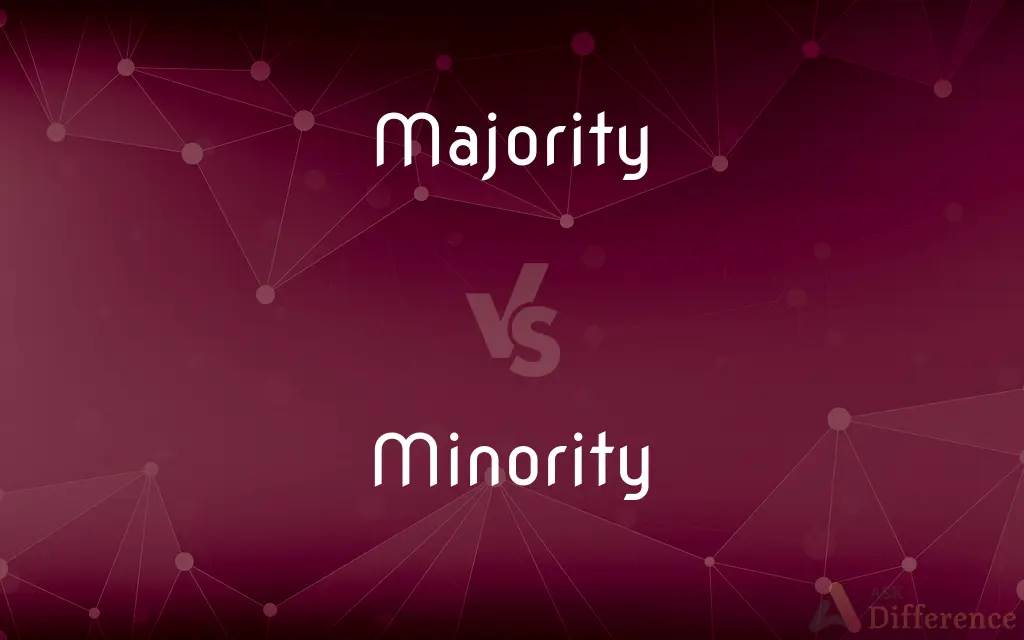Majority vs. Minority — What's the Difference?
By Maham Liaqat & Fiza Rafique — Updated on March 8, 2024
Majority refers to the greater part or number, while Minority signifies a smaller segment.

Difference Between Majority and Minority
Table of Contents
ADVERTISEMENT
Key Differences
Majority is often used to describe the greater part or number in a group, where it represents the portion that is more than half of the total. For instance, in a vote, the majority is the side with more votes than the combined votes for all other sides. Whereas minority refers to the smaller part or number in a group, often used to describe groups that are not in power or are less than half of the total population. For example, in a diverse community, ethnic groups that do not make up the majority of the population can be considered minorities.
Majority can also imply a level of dominance or authority, especially in contexts like politics where the majority party holds significant power. On the other hand, being in the minority can mean less influence and can sometimes lead to marginalization, particularly in legislative or decision-making processes.
In legal contexts, majority is associated with the age at which a person is considered an adult and legally responsible for their actions, which varies by jurisdiction but is commonly 18 years. Whereas minority in this context refers to the state of being below this age, implying a lack of full legal rights and responsibilities.
In sociological terms, majority might not only refer to numerical superiority but also to societal norms and dominant cultural practices. Meanwhile, minority groups can be defined not just by smaller numbers but by their differing ethnic, religious, or cultural characteristics from the majority population.
Despite its numerical implication, majority can sometimes represent a concept rather than a precise count, such as the "moral majority" or when referring to the general consensus. Conversely, minority views or positions, even if held by a large number of people, are those not aligned with the predominant or mainstream opinions or practices.
ADVERTISEMENT
Comparison Chart
Definition
The greater part or number
The smaller part or number
Influence
Often has more power or authority
Typically has less influence
Legal Context
Age of adulthood and full legal rights
Below the age of adulthood, limited rights
Sociological Context
Dominant cultural norms
Distinct from dominant norms due to unique characteristics
Conceptual Use
Can imply general consensus beyond numbers
Represents views not aligned with the mainstream
Compare with Definitions
Majority
Majority refers to more than half of a particular group.
The majority of the class voted for the field trip to the museum.
Minority
Minority indicates a smaller part of a group.
A minority of students preferred the alternative assignment.
Majority
Legally, majority is the age at which one gains adult rights.
She reached the age of majority and could now vote and sign contracts.
Minority
In governance, minorities often have reduced power.
The minority party is striving to negotiate more favorable terms.
Majority
In politics, majority often relates to the ruling party.
The majority party set the legislative agenda for the year.
Minority
In legal terms, minority refers to the period before reaching adulthood.
As a person in minority, parental consent is required for certain decisions.
Majority
Sometimes, majority is used to denote popular opinion.
The majority opinion is in favor of the new policy changes.
Minority
It can also denote groups with distinct ethnic, religious, or cultural identities.
Minority languages are an integral part of the nation's cultural heritage.
Majority
In a societal context, the majority might refer to the dominant ethnic or cultural group.
The majority culture significantly influences national holidays and celebrations.
Minority
Minority can represent less common perspectives.
The minority report offered a different approach to the issue.
Majority
A majority, also called a simple majority to distinguish it from similar terms (see the "Related terms" section below), is the greater part, or more than half, of the total. It is a subset of a set consisting of more than half of the set's elements.
Minority
The smaller in number of two groups forming a whole.
Majority
The greater number or part; a number more than half of the total.
Minority
A group or party having fewer than a controlling number of votes.
Majority
The amount by which the greater number of votes cast, as in an election, exceeds the total number of remaining votes.
Minority
A racial, religious, political, national, or other group thought to be different from the larger group of which it is part.
Majority
The political party, group, or faction having the most power by virtue of its larger representation or electoral strength.
Minority
A group having little power or representation relative to other groups within a society.
Majority
(Law) The age at which a person is recognized as an adult by the law.
Minority
A member of one of these groups. See Usage Note at color.
Majority
The military rank, commission, or office of a major.
Minority
(Law) The state or period of being younger than the age for legal adulthood
Still in her minority.
Majority
More than half (50%) of some group.
The majority agreed that the new proposal was the best.
Those opposing the building plans were in the majority, so the building project was canceled.
Minority
The state of being a minor; youth, the period of a person's life prior to reaching adulthood.
Majority
The difference between the winning vote and the rest of the votes.
The winner with 53% had a 6% majority over the loser with 47%.
Minority
Any subgroup that does not form a numerical majority.
Most people agreed, but a sizable minority were upset by the decision.
Majority
(dated) Legal adulthood, age of majority.
By the time I reached my majority, I had already been around the world twice.
Minority
(US) A member of an ethnic minority.
The company claims it has hired several minorities since the complaint was lodged.
Majority
(UK) The office held by a member of the armed forces in the rank of major.
On receiving the news of his promotion, Charles Snodgrass said he was delighted to be entering his majority.
Minority
(sociology) A group of people seen as distinct who are subordinated and discriminated against in a society.
Majority
Ancestors; ancestry.
Minority
A Muslim.
Majority
The quality or condition of being major or greater; superiority.
Minority
Of or relating to a minority.
They hold a minority interest in the company.
Majority
The greater number; more than half; as, a majority of mankind; a majority of the votes cast.
Minority
Empowered by or representing a minority (usually a plurality) of votes cast, legislative seats, etc., rather than an outright majority thereof.
Minority government
Majority
Ancestors; ancestry.
Minority
The state of being a minor, or under age.
Majority
The amount or number by which one aggregate exceeds all other aggregates with which it is contrasted; especially, the number by which the votes for a successful candidate exceed those for all other candidates; as, he is elected by a majority of five hundred votes. See Plurality.
Minority
State of being less or small.
Majority
The property resulting from being or relating to the greater in number of two parts; the main part;
The majority of his customers prefer it
The bulk of the work is finished
Minority
The smaller number; - opposed to majority; as, the minority must be ruled by the majority.
Majority
(elections) more than half of the votes
Minority
Those members of a legislature that belong to the political party which is in the minority in that institution; as, the bill will pass even if the minority are strongly opposed.
Majority
The age at which a person is considered competent to manage their own affairs
Minority
A group of people who differ racially or politically from a larger group of which it is a part
Minority
Being or relating to the smaller in number of two parts;
When the vote was taken they were in the minority
He held a minority position
Minority
Any age prior to the legal age
Common Curiosities
How is minority different from majority?
Minority refers to the smaller part or less than half of a group, often with less influence.
Can the term majority refer to something other than numbers?
Yes, majority can also imply dominance, authority, or general consensus beyond just numerical superiority.
How is the age of majority significant legally?
The age of majority is when a person is legally considered an adult and gains full legal rights and responsibilities.
How do majority and minority views influence public policy?
Majority views often shape public policy, while minority views can provide alternative perspectives and challenge the status quo.
What defines a majority?
A majority is defined as more than half of a particular group or the greater part.
What does being in the minority mean in a legislative context?
In a legislative context, being in the minority often means having less power and influence over decisions.
Does the minority always have less power?
Generally, yes, but minorities can exert significant influence through coalitions, advocacy, and public discourse.
How are minority rights protected in a majority-rule system?
Through legal frameworks, constitutions, and international agreements that safeguard the rights and interests of minority groups.
Is the age of majority the same in all countries?
No, the age of majority can vary between countries, typically ranging from 18 to 21 years.
What implications does being part of a minority group have?
Being part of a minority group can mean having distinct cultural, ethnic, or religious identities and sometimes facing marginalization.
Is it possible for someone to be part of a majority in one context and a minority in another?
Yes, depending on the context (e.g., sociopolitical, cultural), one can be part of the majority in one and a minority in another.
Can a majority be a cultural concept?
Yes, the majority can refer to dominant societal norms and cultural practices.
What role does the majority play in democratic processes?
In democratic processes, the majority usually determines outcomes, such as election results or policy decisions.
How does being in the minority affect cultural preservation?
Minority groups often face challenges in preserving their cultural heritage but can also contribute to cultural diversity and enrichment.
Can the concept of majority change over time?
Yes, societal shifts, demographic changes, and cultural evolution can alter what constitutes the majority.
Share Your Discovery

Previous Comparison
Aficionado vs. Specialist
Next Comparison
Haunting vs. HuntingAuthor Spotlight
Written by
Maham LiaqatCo-written by
Fiza RafiqueFiza Rafique is a skilled content writer at AskDifference.com, where she meticulously refines and enhances written pieces. Drawing from her vast editorial expertise, Fiza ensures clarity, accuracy, and precision in every article. Passionate about language, she continually seeks to elevate the quality of content for readers worldwide.















































